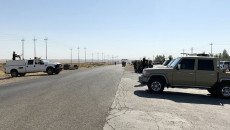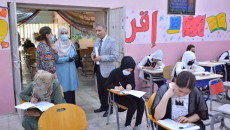Late hours of August 3rd, hundreds of residents of Altun Kopri town, northeast of Kirkuk, protested inadequate national power supply to the town in the blazing summer as temperature passes 45 Celsius degrees.
Director of Kirkuk electricity has decided to block the manager of the town power plant to be replaced soon.
Locals told KirkukNow the national power, subsidized and unlimited consumption, is on only for maximum 12 hours a day and the private power generated by private diesel generators is unaffordable, am ampere for 15,000 Iraqi Dinars IQD ($10), ten folds expensive compared to national power and enough to switch on one fan or a cooler.
“We have two distribution plants in town but we receive less power than all other neighbor districts and sub-districts of Kirkuk,” said Ali Adnan, a resident of Altun Kopri.
“We get maximum 12 hours of national power amid this summer,” he added.
The protest followed calls by the locals to increase power supply “but no one was listening so we decided to protest,” Adnan said.
Altun Kopri (The golden Bridge) is part of the oil rich-city of Kirkuk, home to about 1.2 million Kurds, Turkmen and Arabs, according to Kurdistan Regional Government KRG figures in 2018.
Located 238 kilometers north of Baghdad, Kirkuk is an ethnically mixed province for 1,2 million Kurds, Sunni and Shiite Arabs, and Turkmen. It has long been at the center of disputes between Baghdad and the Erbil.
Though the five oil wells of Kirkuk pump out three million barrels of crude oil a month marketed for over 200 million American Dollars, the province misses proper utilities of power supply, drinking water, garbage collection, and basic health care and education system badly hurt by corruption and long years of war and instability.
Iraq's electricity ministry has cited a number of causes for the prolonged and widespread cuts including terrorist attacks on electricity lines, shortages of fuel for power stations, and the suspension of energy supplies from neighboring Iran.
Kirkuk, Aug. 3rd 2021- Protest over improper power supply in the town of Altun Kopri
The mayor of Altun Kopri said Kirkuk director of electricity to replace the manager of the power distribution in town.
“I have attended the protest with the police and Hashid (Popular Mobilization Forces PMF) and listened to their demands,” said Abdul-Mutalib Najmaddin, mayor of Altun Kopri.
“Kirkuk electricity director decided to replace the manager of the town power distribution and an engineer to replace him,” he added.
The mayor said he agrees that power supply is inadequate and has frequently contacted relevant authorities.
The power supply has caused problems for education sector as final exams are ongoing in the peak of summer.
Tens of halls for class nine final exams in Kirkuk complained of lack of air conditioning in the exam halls in the middle of baking summer while local officials say the warehouses are full of air coolers and conditioners.
Early June, Kirkuk Health director, Nabil Hamdi Boshnaq, stated that power outage in Kirkuk is affecting storage process of Coronavirus vaccines, however he stressed that "no vaccine doses have lost potency."
The Iraqi ministry of electricity follows the standard structure of power generation, transmission then distribution, where every stage of the delivery process is also segmented into regions, each region has a separate company. Iraq is divided into four regions: the south, the middle and upper Euphrates or midlands, Baghdad, and the north.
In 2019, Iraq's gas and thermal power plants generated only 70% of the demand for electricity, local and international studies have shown. Besides, Iraq imports 1200 MW through four lines from its neighbor Iran, 300-400 from Turkey and 200 Mw from Jordan.







